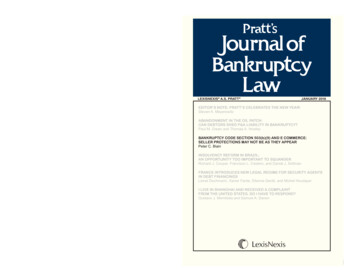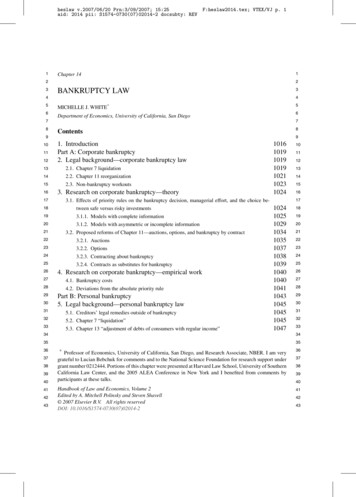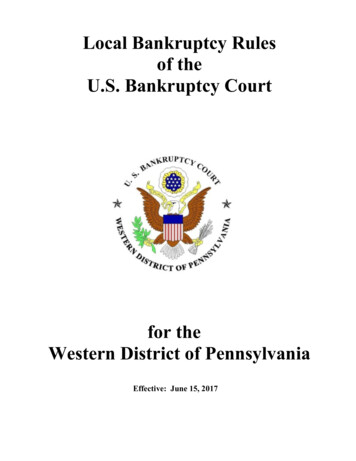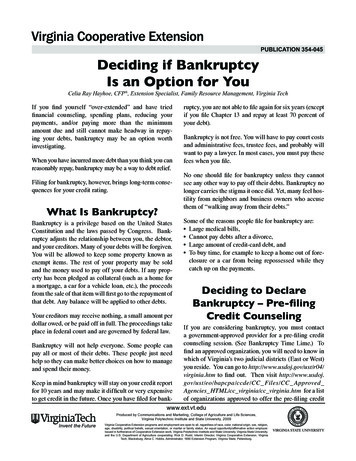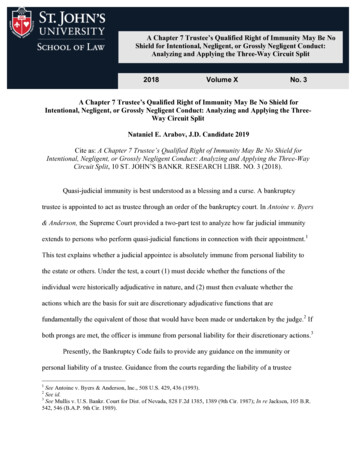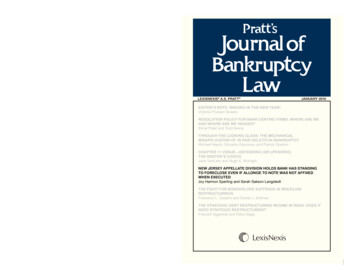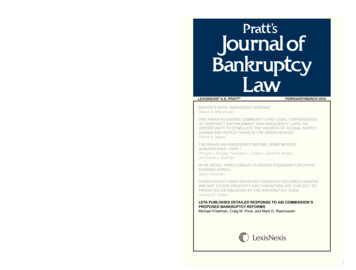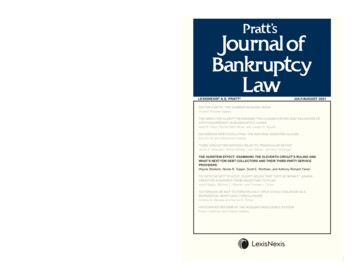
Transcription
PC / Ivory Vellum Carnival 35x23 / 80PRATT’S JOURNAL OF BANKRUPTCY LAWLEXISNEXIS A.S. PRATT JULY/AUGUST 2021EDITOR’S NOTE: THE SUMMER READING ISSUEVictoria Prussen SpearsVOLUME 17 NUMBER 5THE NEED FOR CLARITY REGARDING THE CLASSIFICATION AND VALUATION OFCRYPTOCURRENCY IN BANKRUPTCY CASESBrad M. Kahn, Rachel Biblo Block, and Joseph E. SzydloSOVEREIGN DEBT EVOLUTION: THE NATURAL DISASTER CLAUSESui-Jim Ho and Stephanie FontanaTHIRD CIRCUIT DEFINITIVELY REJECTS TRIANGULAR SETOFFJacob A. Adlerstein, Robert Britton, John Weber, and Alice NofzingerTHE HUNSTEIN EFFECT: EXAMINING THE ELEVENTH CIRCUIT’S RULING ANDWHAT’S NEXT FOR DEBT COLLECTORS AND THEIR THIRD-PARTY SERVICEPROVIDERSWayne Streibich, Nicole R. Topper, Scott E. Wortman, and Anthony Richard YanezTO VOTE OR NOT TO VOTE: COURT HOLDS THAT “OUT OF MONEY” JUNIORCREDITOR IS BARRED FROM OBJECTING TO PLANIngrid Bagby, Michele C. Maman, and Thomas J. CurtinJULY/AUGUST 2021TO FORGIVE OR NOT TO FORGIVE A N.Y. CPLR 3215(c) VIOLATION IN ARESIDENTIAL MORTGAGE FORECLOSUREAndrew B. Messite and Kerren B. ZinnerANTICIPATED REFORM OF THE RUSSIAN INSOLVENCY SYSTEMPolina Lyadnova and Ksenia ObidinaDate: 6/08/2021 Page Count: 60 PPI: 340 Spine width: 0.1765 in
Pratt’s Journal of BankruptcyLawVOLUME 17NUMBER 5July/August 2021Editor’s Note: The Summer Reading IssueVictoria Prussen Spears225The Need for Clarity Regarding the Classification andValuation of Cryptocurrency in Bankruptcy CasesBrad M. Kahn, Rachel Biblo Block, and Joseph E. Szydlo228Sovereign Debt Evolution: The Natural Disaster ClauseSui-Jim Ho and Stephanie Fontana246Third Circuit Definitively Rejects Triangular SetoffJacob A. Adlerstein, Robert Britton, John Weber, andAlice Nofzinger257The Hunstein Effect: Examining the Eleventh Circuit’sRuling and What’s Next for Debt Collectors and TheirThird-Party Service Providers the Reach of Its CreditorsWayne Streibich, Nicole R. Topper, Scott E. Wortman, and AnthonyRichard Yanez260To Vote or Not to Vote: Court Holds That “Out ofMoney” Junior Creditor Is Barred from Objecting to PlanIngrid Bagby, Michele C. Maman, and Thomas J. Curtin263To Forgive or Not to Forgive a N.Y. CPLR 3215(c)Violation in a Residential Mortgage ForeclosureAndrew B. Messite and Kerren B. Zinner270Anticipated Reform of the Russian Insolvency SystemPolina Lyadnova and Ksenia Obidina274
QUESTIONS ABOUT THIS PUBLICATION?For questions about the Editorial Content appearing in these volumes or reprint permission,please call:Kent K. B. Hanson, J.D., at . 415-908-3207Email: . kent.hanson@lexisnexis.comOutside the United States and Canada, please call . . . . . . . . . . . . . . . (973) 820-2000For assistance with replacement pages, shipments, billing or other customer service matters,please call:Customer Services Department at . . . . . . . . . . . . . . . . . . . . . . . . . . (800) 833-9844Outside the United States and Canada, please call . . . . . . . . . . . . . . . (518) 487-3385Fax Number . . . . . . . . . . . . . . . . . . . . . . . . . . . . . . . . . . . . . . . . (800) 828-8341Customer Service Website . . . . . . . . . . . . . . . . . . . http://www.lexisnexis.com/custserv/For information on other Matthew Bender publications, please callYour account manager or . . . . . . . . . . . . . . . . . . . . . . . . . . . . . . .Outside the United States and Canada, please call . . . . . . . . . . . . . . . .(800) 223-1940(937) 247-0293Library of Congress Card Number: 80-68780ISBN: 978-0-7698-7846-1 (print)ISBN: 978-0-7698-7988-8 (eBook)ISSN: 1931-6992Cite this publication as:[author name], [article title], [vol. no.] PRATT’S JOURNAL OF BANKRUPTCY LAW [page number]([year])Example: Patrick E. Mears, The Winds of Change Intensify over Europe: Recent European UnionActions Firmly Embrace the “Rescue and Recovery” Culture for Business Recovery, 10 PRATT’S JOURNALOF BANKRUPTCY LAW 349 (2014)This publication is designed to provide authoritative information in regard to the subject matter covered. Itis sold with the understanding that the publisher is not engaged in rendering legal, accounting, or otherprofessional services. If legal advice or other expert assistance is required, the services of a competentprofessional should be sought.LexisNexis and the Knowledge Burst logo are registered trademarks of RELX Inc. Matthew Bender, theMatthew Bender Flame Design, and A.S. Pratt are registered trademarks of Matthew Bender Properties Inc.Copyright 2021 Matthew Bender & Company, Inc., a member of LexisNexis. All Rights Reserved.No copyright is claimed by LexisNexis or Matthew Bender & Company, Inc., in the text of statutes,regulations, and excerpts from court opinions quoted within this work. Permission to copy material may belicensed for a fee from the Copyright Clearance Center, 222 Rosewood Drive, Danvers, Mass. 01923,telephone (978) 750-8400.Editorial Office230 Park Ave., 7th Floor, New York, NY 10169 (800) 543-6862www.lexisnexis.com(2021–Pub.4789)
Editor-in-Chief, Editor & Board ofEditorsEDITOR-IN-CHIEFSTEVEN A. MEYEROWITZPresident, Meyerowitz Communications Inc.EDITORVICTORIA PRUSSEN SPEARSSenior Vice President, Meyerowitz Communications Inc.BOARD OF EDITORSSCOTT L. BAENABilzin Sumberg Baena Price & Axelrod LLPANDREW P. BROZMANClifford Chance US LLPMICHAEL L. COOKSchulte Roth & Zabel LLPMARK G. DOUGLASJones DayMARK J. FRIEDMANDLA PiperSTUART I. GORDONRivkin Radler LLPPATRICK E. MEARSBarnes & Thornburg LLPiii
Pratt’s Journal of Bankruptcy Law is published eight times a year by Matthew Bender &Company, Inc. Copyright 2021 Matthew Bender & Company, Inc., a member of LexisNexis.All Rights Reserved. No part of this journal may be reproduced in any form—by microfilm,xerography, or otherwise—or incorporated into any information retrieval system without thewritten permission of the copyright owner. For customer support, please contact LexisNexisMatthew Bender, 9443 Springboro Pike, Miamisburg, OH 45342 or call Customer Support at1-800-833-9844. Direct any editorial inquiries and send any material for publication to StevenA. Meyerowitz, Editor-in-Chief, Meyerowitz Communications Inc., 26910 Grand yerowitz@meyerowitzcommunications.com, 646.539.8300. Material for publication iswelcomed—articles, decisions, or other items of interest to lawyers and law firms, in-housecounsel, government lawyers, senior business executives, and anyone interested in privacy andcybersecurity related issues and legal developments. This publication is designed to be accurateand authoritative, but neither the publisher nor the authors are rendering legal, accounting, orother professional services in this publication. If legal or other expert advice is desired, retain theservices of an appropriate professional. The articles and columns reflect only the presentconsiderations and views of the authors and do not necessarily reflect those of the firms ororganizations with which they are affiliated, any of the former or present clients of the authorsor their firms or organizations, or the editors or publisher.POSTMASTER: Send address changes to Pratt’s Journal of Bankruptcy Law, LexisNexis MatthewBender, 230 Park Ave. 7th Floor, New York NY 10169.iv
The Hunstein Effect: Examining the EleventhCircuit’s Ruling and What’s Next for DebtCollectors and Their Third-Party ServiceProvidersBy Wayne Streibich, Nicole R. Topper, Scott E. Wortman,and Anthony Richard Yanez*The U.S. Court of Appeals for the Eleventh Circuit has delivered a novel and highlyconsequential interpretation of the Fair Debt Collection Practices Act that is potentiallytransformative for debt collectors and their third-party service providers.In Hunstein v. Preferred Collection and Management Services, Inc.,1 the U.S.Court of Appeals for the Eleventh Circuit issued a decision on a case of firstimpression, finding that a debt collector’s transmittal of a consumer’s personalinformation to its letter vendor constituted a prohibited third-party communication “in connection with the collection of any debt” within the meaning ofSection 1692c(b) of the Fair Debt Collection Practices Act (“FDCPA”).As discussed below, this ruling has broad ranging ramifications for theaccounts receivable management industry and will likely foster a new wave oflitigation under the FDCPA.BACKGROUNDBy way of background, this lawsuit originated from unpaid bills for medicaltreatment at a hospital. The hospital assigned the unpaid bills to a debt collectorthat had contracted with a third-party vendor for printing and mailing itscollection letters. The collector electronically transmitted to its vendor certaininformation about the plaintiff/debtor such as:(1)His status as a debtor;(2)The exact balance of his debt;(3)The entity to which he owed the debt;(4)That the debt concerned his son’s medical treatment; and*Wayne Streibich (wstreibich@blankrome.com), Nicole R. Topper (ntopper@blankrome.com),and Scott E. Wortman (swortman@blankrome.com) are partners at Blank Rome LLP. AnthonyRichard Yanez (ayanez@blankrome.com) is an associate at the firm. Messrs Streibich, Wortman,and Yanez practice in the firm’s Financial Services Litigation & Compliance. Ms.Topper is amember of the firm’s Litigation group.1994 F.3d 1341 (11th Cir. 2021).260
EXAMINING THE ELEVENTH CIRCUIT ’S HUNSTEIN RULING(5)His son’s name.The vendor then used that information to generate and send a dunning letterto the debtor.The debtor received the dunning letter and then filed a lawsuit in the MiddleDistrict of Florida alleging violations of both the FDCPA and the FloridaConsumer Collection Practices Act.The district court dismissed the lawsuit for failure to state a claim byconcluding that the debtor had not sufficiently alleged that the collector’stransmittal of information to the letter vendor was a communication “inconnection with the collection of a debt.” The debtor then appealed to theEleventh Circuit.THE ELEVENTH CIRCUIT RULINGBefore addressing the merits of the claim, the Eleventh Circuit concludedthat a violation of Section 1692c(b) gives rise to a concrete injury under ArticleIII of the Constitution, thus finding that the plaintiff had standing to bring thislawsuit. The Eleventh Circuit then turned its focus onto whether the allegedcommunication was “in connection with the collection of a debt” such that itviolated section 1692c(b). Notably, the parties agreed that the collector’stransmittal of information to the letter vendor constituted a “communication”within the meaning of the FDCPA.Other than referring to the parties’ agreeability as “helpful,” the decision doesnot provide insight into the context nor explicate the specific definition andapplication agreed upon. In conjunction with this agreed upon interpretation of“communication,” the Eleventh Circuit deployed a quiescent textual view of theSection 1692c(b) phrase, “in connection with the collection of any debt”finding that the phrase “has a discernible ordinary meaning” that “must meansomething more than a mere demand for payment.”Consequently, because the defendant’s transmittal of the plaintiff ’s personaldebt-related information to a letter vendor constituted a communication “inconnection with the collection of any debt” the Eleventh Circuit concluded thatthe plaintiff adequately stated a claim under Section 1692c(b).In its decision, the Eleventh Circuit acknowledged the gravity of its rulingand that it “runs the risk of upsetting the status quo in the debt-collectionindustry.”We presume that, in the ordinary course of business, debt collectorsshare information about consumers not only with dunning vendorslike Compumail, but also with other third-party entities. Our reading261
PRATT ’S JOURNALOFBANKRUPTCY LAWof § 1692c(b) may well require debt collectors (at least in the shortterm) to in-source many of the services that they had previouslyoutsourced, potentially at great cost. We recognize, as well, that thosecosts may not purchase much in the way of “real” consumer privacy, aswe doubt that the Compumails of the world routinely read, care about,or abuse the information that debt collectors transmit to them. Evenso, our obligation is to interpret the law as written, whether or not wethink the resulting consequences are particularly sensible or desirable.2Notwithstanding its recognition that the results from this decision will notbe “sensible” or “desirable” the Eleventh Circuit deferred to Congress as towhether Section 1692c(b) should be amended.CONCLUSIONGoing forward, this case will likely lead to a significant increase in FDCPAlitigation and cause debt collectors to reexamine their operations to minimizeliability in light of this decision. Along these lines, as an interpretativedetermination of first impression, this holding will likely have implicationswithin the retroactive one-year limitation period for filing suit. Although thedecision is only precedential for the Eleventh Circuit, it may be used elsewhereas persuasive authority. It should be noted that this decision may apply to abroad range of third-party providers.3Also, note there are interpretative regulatory interpretations, including fromthe Federal Trade Commission,4 and analogous opinions5 that may be helpfulin reassessing compliance and distinguishing this highly consequential decision.2Id. at 1352.3On May 25, 2021, Preferred Collection filed a petition for rehearing en banc, requesting thefull panel of Eleventh Circuit judges to rehear the appeal.4Statements of General Policy or Interpretation Staff Commentary on the Fair DebtCollection Practices Act, 53 FR 50097-02 (Dec. 13, 1988).5See Davis v. Phelan Hallinan & Diamond PC, 687 Fed. Appx. 140, 144 (3d Cir. 2017);Zortman v. J.C. Christensen & Assocs., Inc., 870 F. Supp. 2d 694, 707 (D. Minn. 2012).262
PC / Ivory Vellum Carnival 35x23 / 80 LEXISNEXIS . PRATT'S JOURNAL OF BANKRUPTCY LAW. Pratt's Journal of Bankruptcy Law VOLUME 17 NUMBER 5 July/August 2021 Editor's Note: The Summer Reading Issue Victoria Prussen Spears 225 The Need for Clarity Regarding the Classification and Valuation of Cryptocurrency in Bankruptcy Cases Brad M. Kahn, Rachel Biblo Block, and Joseph E. Szydlo 228 .

